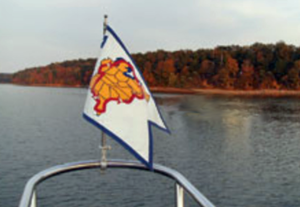The AGLCA
The AGLCA is a great resource for Loopers. Even if you never actually do the Loop, you should consider joining because of the wealth of information from the organizers and from the people who have done or are doing the Loop.
You can ask questions on the forum or listen to the podcast. There’s a cost calculator (if you’re a member) where you can enter information and get a ballpark figure of what the Loop will cost.
You’ll also have access to the list of Harbor Hosts.
Harbor Hosts provide advice and information on local services and things to see and do. Some go above and beyond by offering rides for provisioning, or will meet you at a marina to enjoy Docktails. Many Harbor Hosts have also provided written Harbor Guides about their areas. Please don’t hesitate to contact a Harbor Host. They are waiting for your call or email!
There are also Facebook groups — one just for members and several public ones.
And, there’s a list of blogs written by people doing the Loop. 🙂
We tend to write amusing stories about our journey but I think we should write a few posts about preparing for the Loop.
Here are a few lessons we’ve learned along the way.
Even the Best-Rated Marinas Aren’t That Great
We have an older boat (she turns 24 this year). Most of her life was spent at one Marina. At some point (while still docked at this one Marina), we discovered the generator didn’t work. We asked the Marina to repair it. Their fix didn’t actually fix anything.
We signed up for lessons in Chicago which we were unable to complete because the starboard engine stopped working.
We tried to get that fixed at three separate marinas to no avail. Every marina we stopped at for repairs was highly regarded by Loopers.
Based on our experience, it seems that there is no guarantee that work done will actually fix the issue. Of course, we do a brief (in some cases VERY brief) sea trial to make sure that the issue is fixed and it is for that very brief time. But then, it isn’t.
Lessons Learned
- If you’re not mechanically inclined and you have an older boat, prepare to spend a fair chunk of change on repairs that may or may not work.
- Get an experienced surveyor.
- Get an electrical survey as well as a general survey.
Genertor / Inverter
We didn’t have a working generator or an inverter for our first two boating seasons. This meant we couldn’t anchor out comfortably. There is one 200-mile stretch of the Loop on the Mississippi where you have to anchor out if you have a boat our size. We had to do it without power for our CPAPs. Oh, and our fridge didn’t work.
Your fridge will probably work if it runs off of battery. Ours had blown a fuse at some point during its life and so it didn’t really keep things cold or frozen unless we were connected to shore power. We knew this, but I didn’t take it into consideration when purchasing food for the trip.
We travelled on the hottest day of the year (I think the temp reached 300o F), so I ended up having to throw out several pounds of hamburger meat.
Now that we have a working (for now, knock on wood) generator AND and inverter, anchoring out is much ore pleasant.
Lessons Learned
- Seriously consider getting an inverter if you don’t already have one. You can’t sleep with a gas-powered generator (too dangerous). If you need power for things like CPAPs, an inverter is invaluable.
- Shop wisely if your fridge doesn’t work as well as it should.
Internet
So far, we have managed with Metro by T-Mobile. We don’t have internet everywhere, bit we do have it in most places.
We have unlimited internet for $55 per month. I think originally the price was $50 per month but I cancelled it for a month when we were not on the boat. I did not ask about pausing the service.
You’re not supposed to travel with the tower — it’s home internet. So, if you’re a rule follower, this may not be the solution for you.
But, if you can handle intermittent outages and occasional slow speeds, this is a fairly economical alternative to, say, Starlink.
You do have to buy the tower. It was $99 when we got it.
Lesson Learned
- You can travel with home internet if you’re willing to bend the rules.
Experience
Greg has been around motor boats his entire life. I come from a family of sailors. Neither of us have experience on a boat this size (37 feet not including the swim platform).
Greg had taken some classes at Chapmans and tied to get private lessons in Chicago. Other than that, we were pretty green.
The conventional advice for the Looper life is try it first to see if you like it. That’s probably good advice, especially if you’re living in a big house and plan on getting a Loop-sized boat.
Greg and I had experience living together in a city-sized 700 square foot apartment. It was this experience that made me wonder if we would be able to Loop together in a considerably smaller boat.
The boat is different, though. We each have our own area. Greg is fine with me napping or working down below while he’s driving.
We work well together when docking or locking,
There is a clear chain of command. Greg is the captain and if there is a dispute, his decision is final. This really hasn’t been an issue. The only time it came up was when I wanted to to in the water at Hammond Marina to see if the rope I had dropped in the water had wrapped around the propeller. Greg thought it was too dangerous. We argued a bit back and forth and the Greg played the Captain card.
Note: This only applies to things boat-related. You don’t have to change your relationship so that one partner gets to tell the other partner what to do if that’s already not your dynamic. But, if there is a boat decision to be made, one person has to be in charge.
Once couple commented in a Facebook post that they alternated — he would be in charge one day and she would be in charge the next. I think that’s a great way to go if you’re both into captaining. This is likely what I would have wanted when I was younger. Now, though, I’m happy with Greg being in charge.
Lesson Learned
- If you’re going to be in a small space, make sure you have a way to handle it.
Finances
A lot of people want to know just how much the Loop is going to cost.
You can calculate food, lodging, and gas pretty easily and get a ballpark estimate. What you really can’t account for, though, is repairs.
Boats are money pits, especially older boats. There’s always something going wrong. Even people with newer boats have problems.
You can probably change filters and fluids (oil and transmission) yourself. You may even be able to change an impeller if you have wrist strength and can fit in the engine room. If you’re feeling brave, you can probably repair minor scratches.
Other stuff, though? You’re at the mercy of marinas and if you harken back to the beginning of this post, you’ll see that I don’t have a lot of faith in their ability. Some things were well done. Others, not so much.
Still, if we had the chance to do it over again, we would. We love our boat.
Lessons Learned
- Get an experienced surveyor to do the survey.
- Get an electrical survey as well as a general survey.
- Examine the maintenance records. If there are none, consider walking away.













